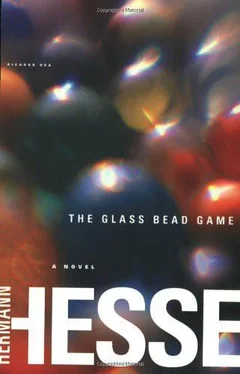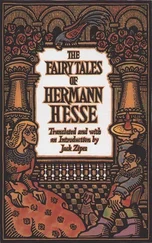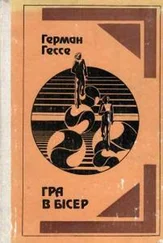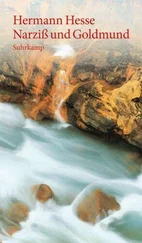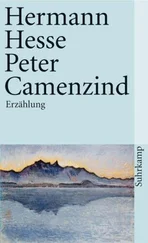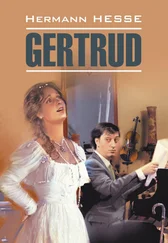In discussing these matters we have approached the sources from which our modern concept of culture sprang. One of the chief of these was the most recent of the scholarly disciplines, the history of music and the aesthetics of music. Another was the great advance in mathematics that soon followed. To these was added a sprinkling of the wisdom of the Journeyers to the East and, closely related to the new conception and interpretation of music, that courageous new attitude, compounded of serenity and resignation, toward the aging of cultures. It would be pointless to say much about these matters here, since they are familiar to everyone. The most important consequence of this new attitude, or rather this new subordination to the cultural process, was that men largely ceased to produce works of art. Moreover, intellectuals gradually withdrew from the bustle of the world. Finally, and no less important — indeed, the climax of the whole development — there arose the Glass Bead Game.
The growing profundity of musical science, which can already be observed soon after 1900 when feuilletonism was still at its height, naturally exerted enormous influence upon the beginnings of the Game. We, the heirs of musicology, believe we know more about the music of the great creative centuries, especially the seventeenth and eighteenth, and in a certain sense even understand it better than all previous epochs, including that of classical music itself. As descendants, of course, our relation to classical music differs totally from that of our predecessors in the creative ages. Our intellectualized veneration for true music, all too frequently tainted by melancholic resignation, is a far cry from the charming, simple-hearted delight in music-making of those days. We tend to envy those happier times whenever our pleasure in their music makes us forget the conditions and tribulations amid which it was begotten. Almost the entire twentieth century considered philosophy, or else literature, to be the great lasting achievement of that cultural era which lies between the end of the Middle Ages and modern times. We, however, have for generations given the palm to mathematics and music. Ever since we have renounced — on the whole, at any rate — trying to vie creatively with those generations, ever since we have also forsworn the worship of harmony in music-making, and of that purely sensuous cult of dynamics — a cult that dominated musical practices for a good two centuries after the time of Beethoven and early Romanticism — ever since then we have been able to understand, more purely and more correctly, the general image of that culture whose heirs we are. Or so we believe in our uncreative, retrospective, but reverent fashion! We no longer have any of the exuberant fecundity of those days. For us it is almost incomprehensible that musical style in the fifteenth and sixteenth centuries could be preserved for so long a time in unalloyed purity. How could it be, we ask, that among the vast quantities of music written at that time we fail to find a trace of anything bad? How could the eighteenth century, the time of incipient degeneration, still send hurtling into the skies a fireworks display of styles, fashions, and schools, blazing briefly but with such self-assurance? Nevertheless, we believe that we have uncovered the secret of what we now call classical music, that we have understood the spirit, the virtue, and the piety of those generations, and have taken all that as our model. Nowadays, for example, we do not think much of the theology and the ecclesiastical culture of the eighteenth century, or the philosophy of the Enlightenment; but we consider the cantatas, passions, and preludes of Bach the ultimate quintessence of Christian culture.
Incidentally, there exists an ancient and honorable exemplar for the attitude of our own culture toward music, a model to which the players of the Glass Bead Game look back with great veneration. We recall that in the legendary China of the Old Kings, music was accorded a dominant place in state and court. It was held that if music throve, all was well with culture and morality and with the kingdom itself. The music masters were required to be the strictest guardians of the original purity of the “venerable keys.” If music decayed, that was taken as a sure sign of the downfall of the regime and the state. The poets told horrific fables about the forbidden, diabolic, heaven-offending keys, such as the Tsing Shang key, and Tsing Tse, the “music of decline”; no sooner were these wicked notes struck in the Royal Palace than the sky darkened, the walls trembled and collapsed, and kingdom and sovereign went to their doom. We might quote many other sayings by the ancient writers, but we shall cite here only a few passages from the chapter on music in Lü Bu We’s Spring and Autumn:
“The origins of music lie far back in the past. Music arises from Measure and is rooted in the great Oneness. The great Oneness begets the two poles; the two poles beget the power of Darkness and of Light.
“When the world is at peace, when all things are tranquil and all men obey their superiors in all their courses, then music can be perfected. When desires and passions do not turn into wrongful paths, music can be perfected. Perfect music has its cause. It arises from equilibrium. Equilibrium arises from righteousness, and righteousness arises from the meaning of the cosmos. Therefore one can speak about music only with a man who has perceived the meaning of the cosmos.
“Music is founded on the harmony between heaven and earth, on the concord of obscurity and brightness.
“Decaying states and men ripe for doom do not, of course, lack music either, but their music is not serene. Therefore, the more tempestuous the music, the more doleful are the people, the more imperiled the country, the more the sovereign declines. In this way the essence of music is lost.
“What all sacred sovereigns have loved in music was its serenity. The tyrants Giae and Jou Sin made tempestuous music. They thought loud sounds beautiful and massed effects interesting. They strove for new and rare tonal effects, for notes which no ear had ever heard hitherto. They sought to surpass each other, and overstepped all bounds.
“The cause of the degeneration of the Chu state was its invention of magic music. Such music is indeed tempestuous enough, but in truth it has departed from the essence of music. Because it has departed from the essence of real music, this music is not serene. If music is not serene, the people grumble and life is deranged. All this arises from mistaking the nature of music and seeking only tempestuous tonal effects.
“Therefore the music of a well-ordered age is calm and cheerful, and so is its government. The music of a restive age is excited and fierce, and its government is perverted. The music of a decaying state is sentimental and sad, and its government is imperiled.”
The words of this Chinese writer point fairly distinctly to the origins and to the real although almost forgotten meaning of all music. For in prehistoric times music, like the dance and every other artistic endeavor, was a branch of magic, one of the old and legitimate instruments of wonder-working. Beginning with rhythm (clapping of hands, tramping, beating of sticks and primitive drums), it was a powerful, tried-and-true device for putting large numbers of people “in tune” with one another, engendering the same mood, co-ordinating the pace of their breathing and heartbeats, encouraging them to invoke and conjure up the eternal powers, to dance, to compete, to make war, to worship. And music has retained this original, pure, primordially powerful character, its magic, far longer than the other arts. We need only recall the many testimonies of historians and poets to the power of music, from the Greeks to Goethe in his Novelle . In practice, marches and the dance have never lost their importance… But let us return to our subject.
Читать дальше
